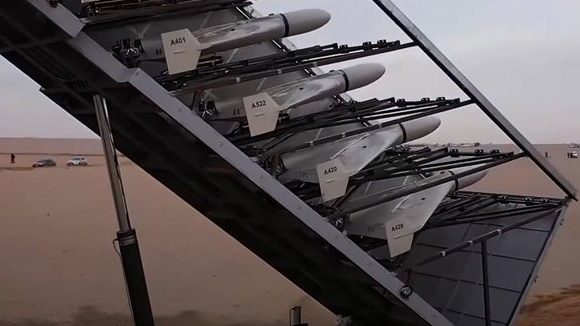West Failed To Recognize Iranian Threat Until It Reached Its Backyard, Experts Say
Military cooperation between Russia and Iran has been ongoing for years, but Western powers only took note once it reached Ukraine
Western powers failed to address the threat of Iranian drones for years until they were used to target civilians in Ukraine, according to regional experts.
The United States recently expressed alarm over what it called a “full-scale defense partnership” between Iran and Russia, calling it harmful to Ukraine, the Middle East and the entire world.
“Russia is seeking to collaborate with Iran on areas like weapons development and trade,” US National Security Council spokesman John Kirby said on Friday. “As part of this collaboration, we are concerned that Russia intends to provide Iran with advanced military components.”
American officials told the Eurasian Times news site that Iranian pilots are in the midst of receiving training in Russia to operate SU-35 fighter jets, and that the Islamic Republic might be take possession of these aircraft as early as next year.
The nexus between Iran and Russia is indeed getting stronger
Dr. Yoel Guzansky, a senior researcher at the Institute for National Security Studies and former member of Israel’s National Security Council, said that the West has only begun to recognize the threat represented by Iran now that it has hit closer to home.
“There’s a double standard here,” Guzansky told The Media Line. “Suddenly when it’s happening in their own backyard it bothers them.”
Last month, European Commission President Ursula von der Leyen told attendees of a security summit in Bahrain that Iran’s drone attacks against civilian targets in Ukraine amount to war crimes. Gulf countries had been warning about the Iranian drone threat for years.
“It took us too long to understand a very simple fact that while we work to prevent Iran from developing nuclear weapons, we must also focus on other forms of weapons proliferation, from drones to ballistic missiles,” von der Leyen said. “It is a security risk, not just for the Middle East but for us all.”
According to Guzansky, those in the conference hall in Bahrain had much to say about these statements.
“People in the hall told her, ‘Finally, you woke up. Iran has been a menace to the region for so many years but when their drones are attacking Ukraine then suddenly it’s a problem,’” he said.
While the scope of military cooperation between the Iranians and the Russians remains unknown for now, Guzansky expressed concern over what the Islamic Republic may be getting in return for helping Russia in Ukraine.
“It can be a few things: all kinds of weapons systems that the Russians have or money,” he noted. “I’m afraid it might also be some assistance in the nuclear field and this is where Israel should be worried. The nexus between Iran and Russia is indeed getting stronger.”
Similarly, Avi Melamed, president and founder of Inside the Middle East: Intelligence Perspectives, told The Media Line that the evolution of ties between Tehran and Moscow was not surprising.
“The balance of power in the Middle East has changed already in the sense that the Iranians have advanced military capacities when it comes to drones and other things,” Melamed said. “The world was looking the other way. Now that the war is at the West’s back door it’s a different story.”
If you don’t deal with a small problem then you’re going to have to deal with a big problem
On Syria, Russia and Iran have been on the same side of the equation with regard to saving Assad’s regime.
Israel has tried to remain mostly neutral about the Russian invasion of Ukraine, due in part to its need for the consent of Russia – which patrols Syrian airspace – to carry out airstrikes against Iranian terror proxies in Syria.
In the past decade, Iran tested out its more advanced weaponry – including drones and ballistic missiles – on numerous occasions against several targets in the Middle East, Melamed notes, including Yemen, Saudi Arabia and the United Arab Emirates.
“It was not addressed as seriously as it should have been back then by the West, as part of the negotiations over the JCPOA (Joint Comprehensive Plan of Action),” he said, using the official name of the now-defunct nuclear agreement between Iran and the world powers. “So, it is not surprising that you see Iranian drones killing Ukrainian citizens in Europe.
“If you don’t deal with a small problem then you’re going to have to deal with a big problem,” Melamed said.


